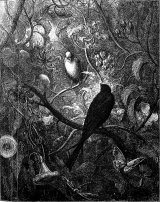Philomel and Progne
"Philomel and Progne" is a narrative poem penned by the French author Jean de La Fontaine. It is an adaptation from Greek mythology and is a tale of two sister's revenge against a powerful man who sexually assaulted one of them. The story encompasses themes of betrayal, justice, and vengeance, delivering a bleak portrayal of human nature.
Genre: Fable
Genre: Fable
- Year:
- 1668
- 43 Views
Progne, the Swallow, set forth from her dwelling, And, leaving the cities afar, took flight For the grove that Philomel chose for telling Her ancient griefs to the listening night. "Sister," said Progne, "I have not met you For nearly the space of a thousand years. Why are we parted? I cannot forget you, Nor banish our Thracian trials and tears. Come, leave this wood; it is dark and lonely." "What haunt could be pleasanter?" Philomel asked. "And is it," said Progne, "for animals only, Or peasants at best, that your efforts are tasked? With a note so rich 'tis a thousand pities To scatter its charms to the desert air. Come, quit this grove to delight our cities, And waste no longer a gift so rare. These woods, my sister, must oft remind you Of all the sorrow King Tereus wrought. Leave, leave the terrible days behind you, And give to the past not a tearful thought." "'Tis the memory, dear, of our Thracian troubles," Said Philomel, sadly, "that bids me stay; For the sight of humanity only doubles The grief of the times that have passed away!"
Translation
Translate and read this book in other languages:
Select another language:
- - Select -
- 简体中文 (Chinese - Simplified)
- 繁體中文 (Chinese - Traditional)
- Español (Spanish)
- Esperanto (Esperanto)
- 日本語 (Japanese)
- Português (Portuguese)
- Deutsch (German)
- العربية (Arabic)
- Français (French)
- Русский (Russian)
- ಕನ್ನಡ (Kannada)
- 한국어 (Korean)
- עברית (Hebrew)
- Gaeilge (Irish)
- Українська (Ukrainian)
- اردو (Urdu)
- Magyar (Hungarian)
- मानक हिन्दी (Hindi)
- Indonesia (Indonesian)
- Italiano (Italian)
- தமிழ் (Tamil)
- Türkçe (Turkish)
- తెలుగు (Telugu)
- ภาษาไทย (Thai)
- Tiếng Việt (Vietnamese)
- Čeština (Czech)
- Polski (Polish)
- Bahasa Indonesia (Indonesian)
- Românește (Romanian)
- Nederlands (Dutch)
- Ελληνικά (Greek)
- Latinum (Latin)
- Svenska (Swedish)
- Dansk (Danish)
- Suomi (Finnish)
- فارسی (Persian)
- ייִדיש (Yiddish)
- հայերեն (Armenian)
- Norsk (Norwegian)
- English (English)
Citation
Use the citation below to add this book to your bibliography:
Style:MLAChicagoAPA
"Philomel and Progne Books." Literature.com. STANDS4 LLC, 2024. Web. 3 May 2024. <https://www.literature.com/book/philomel_and_progne_2508>.




Discuss this Philomel and Progne book with the community:
Report Comment
We're doing our best to make sure our content is useful, accurate and safe.
If by any chance you spot an inappropriate comment while navigating through our website please use this form to let us know, and we'll take care of it shortly.
Attachment
You need to be logged in to favorite.
Log In